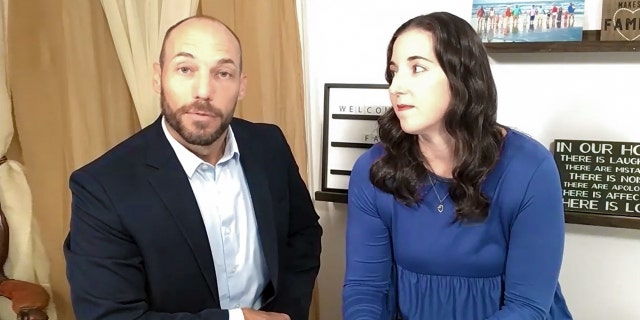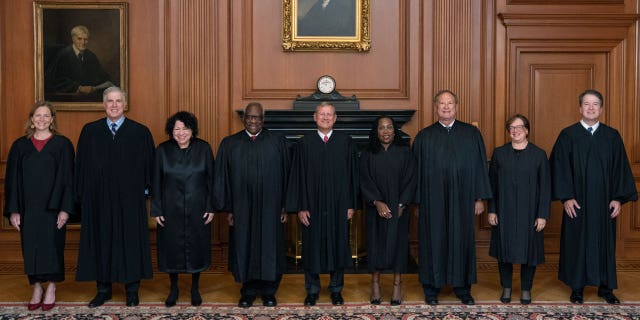[ad_1]
Chad and Jennifer Brackeen virtually had their Native American adopted son taken away from them due to a federal legislation that codifies what their legal professionals say is “racial discrimination.” Now, the household is preventing to maintain custody of his half-sister via a Supreme Court case that might intestine a serious a part of that legislation however which Native tribes warn might strike a far-reaching blow to their sovereignty.
The case, Haaland v. Brackeen, combines instances from a handful of different households and a number of states, together with Texas, the place the Brackeens stay. On the heart of the controversy is the Indian Youngster Welfare Act (ICWA), a Seventies legislation meant to guard Native American kids in state little one custody proceedings.
The legislation was a response to excessive charges of Native kids being adopted by non-tribal members – usually with little course of and unjustly. It prioritizes inserting Native kids with prolonged relations, members of their tribe, and if that is not doable, with one other Native household. Exceptions for “good trigger” are allowed however not particularly outlined.
“Congress’s racial discrimination is ‘most evident’ in ICWA’s third placement choice … which bluntly favors any ‘Indian famil[y]’ from any of 574 tribes over any non-Indian household,” a quick from the Brackeens’ legal professionals says.
“The position preferences ‘function individually and collectively’ to drawback non-Indian dad and mom in search of to undertake an Indian little one,” reads the court docket submitting.
SUPREME COURT TAKING UP CASE FROM COLORADO ARTIST FOR RELIGIOUS LIBERTY

Chad and Jennifer Brackeen informed Fox Information Digital that they’re fearful their adopted daughter, Y.R.J., might be “ripped” from their household due to the Indian Youngster Welfare Act.
(Tyler Olson/Fox Information Digital)
The Brackeens’ legal professionals additionally argued that Congress overstepped its bounds by making an attempt to manage state child custody proceedings.
The Brackeens started fostering their adopted son, referred to in court docket paperwork as A.L.M., in 2016, after his mom, a member of Navajo Nation, was unable to take care of him. Navajo Nation ultimately recognized A.L.M. as a member of its tribe greater than a yr later, based on the Brackeens, and sought to put him with different tribal members who weren’t associated to him and lived in a unique state.
“That they had determined that we weren’t an appropriate dwelling for him. And so we determined to pursue adoption via the court docket system,” Jennifer Brackeen informed Fox Information Digital.
The household to whom the Navajo Nation wished to ship A.L.M. stepped again from the proceedings, and the Brackeens gained custody. However their adoption saga continued after A.L.M.’s mom gave delivery to his half-sister, often known as Y.R.J.
The organic mom supported placement with the Brackeens. However Navajo Nation sought to put Y.R.J., based on the Brackeens’ legal professionals, “in one other state tons of of miles away with both a great-aunt or an unrelated Navajo couple.”

The Supreme Court docket will hear the case Haaland v. Brackeen on Nov. 9, 2022. A number of Native American tribes and a handful of states are additionally events within the case.
(Assortment of the Supreme Court docket of the USA through Getty Photos)
NJ LAWMAKERS RECONSTRUCT GUN CARRY LAWS AFTER SUPREME COURT RULING
That case continues to be in a state court in Texas. However the Brackeens’ legal professionals say the results of their Supreme Court docket case, which stemmed from their combat to maintain A.L.M., will possible determine the results of Y.R.J.’s case and thus the way forward for their household.
“It has been three and a half years in court docket, and we have now not been capable of finalize that adoption,” Chad Brackeen stated.
“Our youngsters are younger, our oldest is 13, the child sister is 4 and a half. So, to a point, solely the oldest are totally conscious of what we’re going via,” he added. “And it is our accountability to form of protect our kids at this level of the uncertainty, that she might in the end be taken, ripped from our dwelling and moved states away.”
The tribes, in the meantime, say the Brackeens’ argument that favoring placement with Native households is similar as racial discrimination ignores centuries of U.S. legislation treating the tribes as political entities, not racial teams. The tribes on the case, together with Cherokee Nation, Oneida Nation and the Morongo Band of Mission Indians, say this understanding is essential to “Congress’ distinctive obligation towards the Indians.”
“The precedent of the Supreme Court docket is that Indian tribes are political teams of individuals, they don’t seem to be racial teams of individuals,” Chrissi Ross Nimmo, the deputy lawyer basic of Cherokee Nation, informed reporters Tuesday. “Tribes decide citizenship … similar to nations.”

The Supreme Court docket subsequent month will hear a case that might have main ramifications for Native American sovereignty.
(AP Photograph/J. Scott Applewhite, File)
CALIFORNIA TO VOTE ON CONSTITUTIONAL RIGHT TO ABORTION
If the Supreme Court docket have been to rule that ICWA’s provisions are racially discriminatory, Nimmo stated, it will convey into “query different areas of federal Indian legislation, and fairly frankly, the fashionable day existence of Indian nations in our nation.”
“Tribes are separate sovereigns, and the Structure expressly authorizes Congress to legislate particularly for Indians,” a quick from the tribes says. “Congress has thus passed statutes that legislate particularly for Indians — defending their lands, regulating their commerce, punishing crimes towards them, managing their sources, and offering training, housing, and healthcare (sic).”
Kate Fort, the director for the Indian Legislation Clinic at Michigan State College, known as the case a “facial assault on tribal sovereignty.” She additionally stated it might “result in a elementary re-understanding of how Congress can or can not go legal guidelines for tribes.”
Fort stated other litigants suing over an alleged playing monopoly for Native Individuals in Washington state are already mimicking the arguments getting used within the Brackeen case.
CLICK HERE TO GET THE FOX NEWS APP
Nimmo additionally stated that the tribes deal with 1000’s of adoption and foster instances per yr underneath ICWA, virtually at all times with optimistic outcomes. Circumstances just like the Brackeens’, wherein there is a important dispute over the place to put a baby, characterize only a “tiny fraction,” she stated.
The Brackeens, nevertheless, say they’re simply looking for the most effective curiosity of the youngsters whose care they’re entrusted with.
“Finally, these two siblings belong collectively,” Chad Brackeen stated. “We really feel {that a} transfer at this level to interrupt these bonds which have developed over time can be detrimental to her and in the end be detrimental to our son.”
The case is ready for oral argument earlier than the Supreme Court docket on Nov. 9.
[ad_2]
Source link
